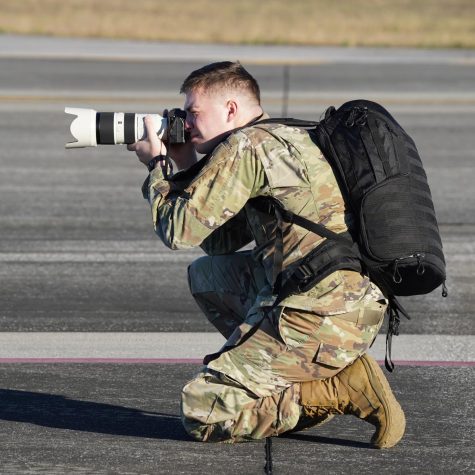Industry approach prepares comm students for the field
April 12, 2023
The Communication Department at the University of West Florida takes a unique approach to education that prepares students to work in the industry. UWF boasts the title of being the number one school for graduates finding work right out of university.
The “comm” department boasts this stat in a number of ways. There are ample internship and job fairs specific to the field, an event called HIREDTalk where students can field questions to a panel of employers in communications, connections with professional organizations such as the Florida Public Relations Association and plenty of opportunities to gain experience in related on-campus jobs in places like the athletic and marketing departments.
“What I love so much about being a comm major is the hands-on projects and group projects that are given,” said Jessica Voigt, a communication student at UWF. “We are given so many opportunities from our professors to test out what we might be interested in for our future. For example, I know Will Kennedy gives his students the chance to film for some of the sports that we have on campus.”
The department stands out from other universities through its hands-on course curriculum meant to reflect actual projects communication practitioners would be doing. Students can find themselves creating fleshed-out strategic communications plans for actual organizations and initiatives, running real social media accounts and building portfolios from their projects that they could send to prospective employers.
“My teaching philosophy is based on Dewey’s theory of pragmatism, where instructors use student experiences as a starting point for learning new concepts,” said Heather Ridell, assistant professor in communications. “I embrace this approach because most of my students are on social media, and many have work experience in the field. I can use their previous experiences to provide context as we move into professional social media usage. Additionally, I believe hands-on assignments that engage students and provide new experiences are the best way to teach lessons.”
The courses offered are also dynamic, changing regularly between semesters based on changes in the marketplace and demands of the communication field. Students could find themselves taking anything from military media to crisis communications or integrated public relations concepts to death communications.
Practicum courses available to undergrads are also hands-on and have real-world uses. Journalism minors write for the school newspaper, The Voyager, while social media minors usually run actual pages. The model of the comm department allows it to be flexible in response to emerging technologies and platforms through constantly having fresh eyes on the execution of the projects and courses.
One new class that was spearheaded by Ridell is “Social Media Agency.” In the course, students are creating content, doing legal research and engaging with the community on an Instagram page called “Criminals in the Classroom.” Local juvenile court judges reached out to the university for a crime prevention campaign to keep local youth out of trouble. The curriculum in legal agency allows students to work with the judges to curate messages in a way that will be effective in reaching and resonating with adolescents.
“This is a great class not only because we are spreading vital information but also because I get to see the creativity and passion of the students as they help others,” said Ridell. “I’m excited to run this class again in the fall and continue to share preventative information with at-risk youth in our region.”
Social media outlets in flux along with the proliferation of artificial intelligence and the wide range of tools and threats it brings with it, keeps the industry on its toes. The university is preparing students to meet these challenges with confidence and adaptability to change.
“I think that [the communications department] has given me so many tools and opportunities that I would not have gotten if I chose any other major,” said Voigt. “I think the comm department has some of the best professors and people.”


